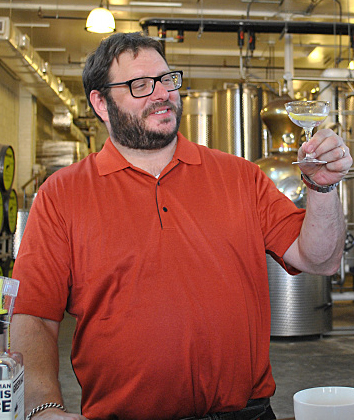
Joshua Ozersky, one of America’s most passionate and eloquent food writers, died on Monday in Chicago, where he was attending the James Beard Awards. The cause of death was undetermined.
Ozersky, 47, was a Beard winner himself, the author of several books on food, a columnist for Esquire and a former contributor to TIME and many, many other publications. He was also my friend. I met Josh in 1998. I was writing for Salon then, and I knew and admired his writing from around the web. He was living in Corning, N.Y., doing corporate writing as a day job, and he invited me out of the blue to get a drink in Manhattan and ask my advice on taking his freelancing full-time.
I don’t remember what advice I gave him, and whatever it was, he didn’t need it. Within a few years, he was embedded in New York’s food and restaurant culture. He was expansive, gregarious, a character of his own authoring: he wrote his “carnivore’s guide to New York,” Meat Me in Manhattan, under the name Mr. Cutlets, a pseudonym cribbed from Herman Melville’s “Bartleby the Scrivener.” He got to know the people who ran restaurants and learned how they work. He was a polymath and a performer; he produced a series of web videos, appeared on TV, and created Meatopia, a traveling, growing celebration of the fatty, sanguineous vittles he loved. (I remember a very early incarnation, in the back of a New York bar, which Josh kicked off with the benediction that became his personal credo of lusty eating: “The fat is the meat, and the meat is the vegetable!”)
Josh didn’t start out as a food writer, though. He wrote about pop culture, art, media; in 2003, he published Archie Bunker’s America, a sweeping, historically astute study of TV in the 1970s. It made sense that he would turn to food writing, though. Not only did he love to eat, he realized that food was culture that you engaged with, literally, on a gut level.
When Josh wrote about food, it was personal and forceful. Sometimes that meant controversy and feuds, but it elevated his writing above trend-chasing and meal-description. (Though he wrote about restaurants and loved to discover them, he always stressed that he was not a “restaurant critic” and didn’t want to be one.) He liked what he liked, whether it was high-end restaurant cuisine or Kozy Shack pudding. Josh didn’t just write about what to eat, but how to eat, why we eat, what needs eating fills.
If a journalist is good enough, it doesn’t matter what his or her subject is. Even if you eat peanut butter on saltines for three meals a day, Josh’s work still has something to say to you. For Saveur, he wrote about connecting with his father, an unrecognized artist, over souffles and Chinese takeout ribs. When he was cropped out of a photo on the wall of Katz’s Deli, he cut a hilariously confessional video rant on the hustle for fame. He rebelled against the MFK Fisher school of writing, arguing that our popular, romanticized food-lit leaves out the truth of many people’s lived experience: “My own formative encounters with food had exactly no connection to the seasons, to romance, to good times or for that matter bad ones. I self-medicated with it.”
One of Josh’s pieces that sticks with me is a simple list he wrote for Esquire of rules for dining out. It’s practical, funny, and typically impatient with pretense (“6. Life is too short for platonic love affairs or savory desserts”). But it’s also, when you get down to it, a wise, succinct guide on how to live. It ends by addressing the question of “ethical dining” with a perfect note about morality and humility:
“Feeling ethical?” he writes. “Tip well and take home what you don’t eat. And don’t talk about your moral choices. It’s boorish and contrary to the spirit of morality. Pipe down and do the best you can. That’s all that can reasonably be expected of anybody.” RIP.
More Must-Reads from TIME
- Donald Trump Is TIME's 2024 Person of the Year
- Why We Chose Trump as Person of the Year
- Is Intermittent Fasting Good or Bad for You?
- The 100 Must-Read Books of 2024
- The 20 Best Christmas TV Episodes
- Column: If Optimism Feels Ridiculous Now, Try Hope
- The Future of Climate Action Is Trade Policy
- Merle Bombardieri Is Helping People Make the Baby Decision
Contact us at letters@time.com